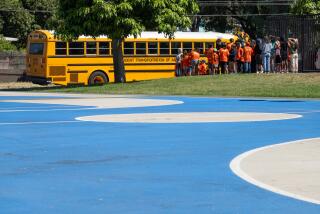Inventor Cashes In on a Hot Market by Helping Keep Millions of Cars Cool
- Share via
Thousand Oaks businessman Abraham Levy is hardly famous, but his creation may be as familiar to Southern California drivers as scorching hot seats and sun-cracked dashboards.
About 18 years ago, Levy created a folding cardboard sun shield that millions use today to keep dashboards and car seats from getting too hot. He calls it CarCool, and like a father, he is deeply attached to his creation.
“Every father is proud of his children, and every inventor is proud of his invention,” the silver-haired, 63-year-old inventor said.
Sitting in his office surrounded by large photographs of the shade, Levy has good reason to be proud. Royalties and licensing fees he gets from other companies that manufacture and distribute the shade have made him a millionaire. Although he declines to reveal his income, the car shade has spawned a $300-million industry since he began marketing the invention in the early 1980s.
Levy has seen then-Secretary of State Henry Kissinger use his car shade on visits he made to Israeli Prime Minister Golda Meir.
He estimates that fewer than half of the shades are used just for protecting cars. The rest are also used for advertising purposes, imprinted usually with the names and logos of large companies such as Pepsi and Coca-Cola. About half of U. S. car owners today own a car shade, he said.
But the popular car shade has been a magnet for bootleggers.
Since acquiring the U. S. patent 11 years ago, Levy has spent $2.5 million on 30 lawsuits against those who pirate his design.
In all cases, the defendants settled out of court and agreed to pay the roughly 10- to 15-cent royalty Levy demands. Only last year, he won a $250,000 judgment from L & M Enterprises of Phoenix, Ariz.
“I’m not looking for blood,” said Levy. “I call them shoplifters. They try to steal my idea.”
Another company, Empire Container of Carson, settled in 1987, but ceased manufacturing the car shade instead of paying Levy royalties, said owner Lewis Eagle.
Eagle still contends that the car-shade design is not a novel idea and that Levy does not deserve the patent. Similar accordion-like pieces of cardboard have been widely used in the packaging industry since the 1960s, he said.
“It’s a great idea, but it’s not an invention,” Eagle said in a telephone interview. “It’s like holding a patent on a corrugated box--it’s as simple as that.”
Levy discovers imitations when distributors pass along samples missing his patent number and the CarCool name. That discovery is usually followed immediately by a lawsuit.
Levy’s expensive legal battles are not unusual among inventors, said Margaret Morrell, deputy director of the International Anticounterfeiting Coalition in Washington.
A survey last year of the group’s 120 members indicated that they spend an average of 70% of their gross sales revenues in legal fees and expenses, and that the average lawsuit took about 1 1/2 years to resolve.
Levy said he invested years of research and almost went broke marketing the shield.
Ironically, the source of Levy’s invention was the scorching Israeli desert, not California sunshine. Levy found himself fashioning makeshift sun shades to insulate his car from the 100-degree heat.
“I hated to go into my hot car. I was using anything that was handy,” he said. “Originally. I was thinking of making something for my own car, and then I thought, why not make it for everybody?”
Levy experimented with hinged devices made out of plywood, aluminum and Styrofoam before devising cardboard prototypes in the early 1970s.
Nobody would accept the first shields. He hired out-of-work students to hawk them at beaches and parking lots, but there were no takers. Then during the Yom Kippur War in 1973, Levy donated thousands of shades to the Israeli government for use on military vehicles.
He received a thank-you letter, but no sales materialized.
Finally in 1977, a newspaper called Haaretz decided to offer the shields as an advertising promotion to sell classified ads. The promotion worked and Levy secured a patent soon after.
In 1980, Levy received his first U. S. patent for the CarCool shade. He moved his headquarters to the Conejo Valley in 1986. Today Levy has licensed 350 manufacturers to produce the shades. He still gives sun shields away, but not to promote sales.
In January, Levy received thank-you letters from President George Bush and Secretary of Defense Dick Cheney after he donated 35,000 folding shades to U. S. troops stationed in Saudi Arabia. The shades were used on jeeps, trucks, personnel carriers, helicopters and jet fighters.
Sales remain brisk, and he estimates that 100 million shades have been sold nationwide since they became popular in the mid-1980s. Today, with millions of shades already in use, the price has declined from the original $5. They now retail for $2 to $4. He recently won another patent for a car shield with handles that can also double as a sign.
Always the visionary, Levy is now exploring ways to soothe motorists who become frazzled in heavy traffic.
“The car population is exploding all over the world,” he said. “What I think people need now is something to take out all that tension when they drive.”





